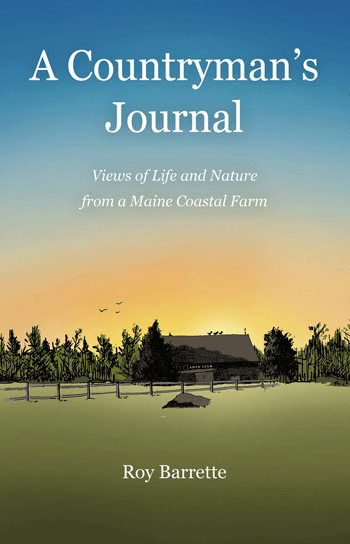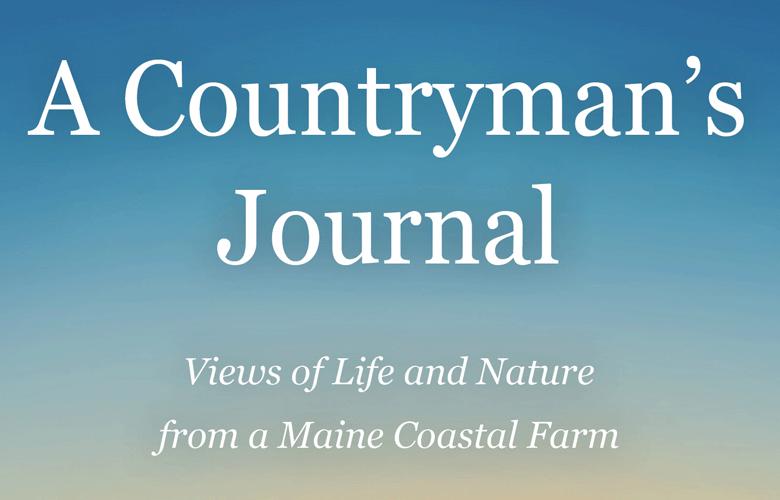A Countryman’s Journal: Views of Life and Nature from a Maine Coastal Farm
By Roy Barrette (Islandport Press 1981, 2022)
Review by Tom Groening
For my money, no one can top E.B. White in the short essay genre. White’s work, especially that written from his farm in Brooklin and collected under the title One Man’s Meat, hits the mark on being reflective, insightful, colorful, and as easy and companionable as a chat with an old friend.
I think a couple of generations of newspaper columnists have tried to emulate White, and though that’s not a bad strategy, few have reached that lofty success.
I don’t believe Roy Barrette was trying to fill White’s large shoes, but as I learned from reading A Countryman’s Journal, a collection of Barrette’s columns for the Ellsworth American and Berkshire Eagle, he actually lived just down the road from White in Brooklin. In fact, the two men were friends.
The Countryman’s Journal seems to pull from columns published in the period from 1958 to 1981, when the collection was first published. The content in One’s Man Meat came from the late 1930s and into the 1940s, so A Countryman’s Journal can be seen as the next generation of the genre and an artifact of a Maine era in which outside forces wrought changes still visible today.
Islandport Press reissued the collection this year, and I’m glad they have.
While newspaper columns often, necessarily, address issues of the day, the selections of Barrette’s work are timeless, or at least they lead one to contemplate the timeless and universal qualities of life on the Maine coast.

The columns lean heavily on the natural world, and particularly on his and his wife’s gardening and animal husbandry at their farm on the road that leads from Brooklin center to Naskeag Point. The property is well-known to locals and people like me, who have driven by on their way to the point and harbor.
Several years ago, the farm was purchased by two-time independent gubernatorial candidate Eliot Cutler. Cutler was in the news earlier this year for an arrest on child pornography charges, an association that shouldn’t mar enjoyment of reading this collection.
Barrette’s knowledge of garden vegetables, fruits, and flowers is not that of recently retired hobbyist. Though born in the U.S. in 1897, he was raised in England, and much of his understanding of farm life seems to have come from that upbringing.
In fact, he makes a point of reminding readers that while he and his wife are financially comfortable, their refrigerator, freezer, and pantry are well-stocked with critters and produce raised there.
The one criticism I have of A Countryman’s Journal is that there are no dates associated with the selections. When Barrette expresses regret about the way the world is “today,” I wonder if he responding to the social and political upheaval of 1968 or 1979.
Still, I suppose the universality of his ponderings supersedes dates, like this:
“I believe, too, as I believe nothing else, that man’s greatest need today is for occasional solitude, time for contemplation… Fog has hung over Naskeag Point every day now for more than two weeks. I could bemoan it and complain that it is mildewing my roses and spoiling my view…
“But I have noticed that the robins are swooping low over the pasture gathering insects (blackflies, I hope), and that the wet leaves of my lilacs look varnished in the light from the kitchen windows. Who am I to quarrel with the shape of life?”
Barrette died in 1995 at the age of 98.
Though different in style and subject, A Countryman’s Journal reminds me of another pleasurable read that evokes a recent Maine past. Salt Water Town—Tales from Castine, Maine, by Donald A. Small (Penobscot Press, 2016) is a collection of vignettes, some literal, some fictionalized, of that lovely Hancock County harbor town in the 1950s.
As autumn creeps toward winter, I think you could do worse than settle in with these two books.
Tom Groening is editor of The Working Waterfront.





